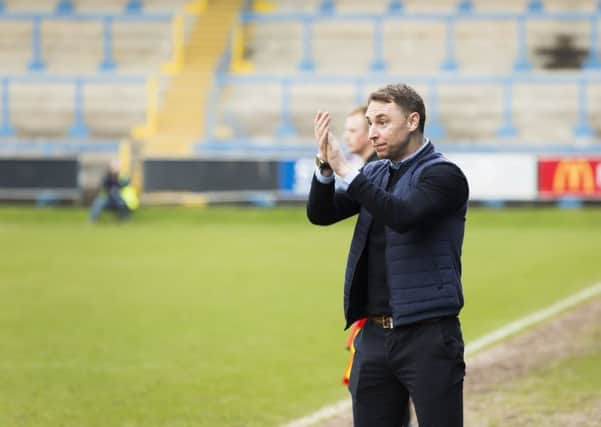FC Halifax Town: '˜I'm passionate about what I do', says Town boss Fullarton


Perhaps Jamie Fullarton was always destined to be a manager.
Fullarton played in the top flight in England, Scotland and France during his career as a midfielder, and captained the Scotland under-21 side.
Advertisement
Hide AdAdvertisement
Hide AdThe FC Halifax Town boss is the first to admit he wasn’t lavishly gifted as a footballer, but made up for that with a voracious work ethic and will to win, attributes he has taken into management.
“There’s a definite personality and characteristic trait required to even consider being a manager,” he says.
“It comes down to your personality and the traits you have.
“As a player, the irony was I was a Ford Focus and played with Mercedes’ and Ferrari’s, but that’s because I was always 7,000 revs in fifth gear.
“There’s always that debate about top quality players sometimes not becoming top quality coaches.
Advertisement
Hide AdAdvertisement
Hide Ad“I think sometimes when you ask a top quality player why or how they do certain things, they can’t answer it because they say it’s instinctive.
“I was never fortunate enough to be that instinctive. So I had to be able to break things down to a level for me to understand to be able to apply it.
“Then when you become a coach and you’re used to having to break it down, you find it easier to transmit information.
“When you’re that way inclined, it gives you a foundation to cross over into the dark side shall we say.
Advertisement
Hide AdAdvertisement
Hide Ad“Then once you’ve earned your coaching stripes, management is the next step up. You’re implementing the coaching but you’re making decisions as well.
“As a player, I led, I was that type, and that’s because I had to maximise my strengths in order to cover up my weaknesses in certain aspects.”
Fullarton’s zeal for football is obvious, and manifests itself in a meticulous approach to his trade.
“The only thing that rivals football in my life is my two children,” he says, “which makes me a very boring conversationalist in the school yard when I pick them up!
Advertisement
Hide AdAdvertisement
Hide Ad“Is it a life you choose or does it choose you? That’s a debate, but the way I am, my personality and character traits, I’m passionate about what I do, I’m enthusiastic.
“There are many forms of leading, but if you’re going to lead, you set the attitude and you have to lead from the front, whether it’s as a player or a manager.
“It’s still a learning process for me on this side of the fence, but you have to learn what you control and what you have fingerprints over.
“Preparation and recruitment is what directly affects your job as a manager, so you must take responsibility to control that, because then you have an influence over how long you’re in the job for.
Advertisement
Hide AdAdvertisement
Hide Ad“When I say preparation I mean the training ground - what you do, how you do it, why you do it, and work towards the three points on a matchday.
“Recruitment is the material that comes in for you to be able to use your preparation to go and win games.
“The other aspects of a football club are integrated, they’re the support network for that, so you have to be involved in that.
“But you have to differentiate between what you can control and what you can have your fingerprints over, that’s whether it’s a light touch or a bit more involvement, and that varies from having enough knowledge and understanding to challenge people to be better, or whether it’s you being able to guide.
Advertisement
Hide AdAdvertisement
Hide Ad“It varies from every aspect if the club but I think that’s important that, as I’m becoming more experienced, that I can delegate, reduce or control the fingerprints, and it’s defining which areas to do that and how much you do.”
Town’s move to a full-time model this summer may have been a necessity given the nature of the National League in 2018, but it also plays to Fullarton’s strengths of developing players, which he has honed at the likes Bolton, Nottingham Forest and Bristol Rovers.
And Fullarton is relishing having more time to spend with his squad on the sanctuary of the training pitch.
“For any coaching manager, which I would describe myself as, although others might describe me as something else, that’s your solace at a football club,” he adds.
Advertisement
Hide AdAdvertisement
Hide Ad“Football’s a fantastic game. There’s lots of things some managers might rather not have to deal with, but you have to deal with it. That’s part of being a leader in any walk of life.
“You have to make decisions and you have to do things you don’t like, whether you’re a nine-year-old like my son, or a seven-year-old like my daughter, or a fully grown adult in whatever organisation you work in.
“But as a coaching manager with an enthusiasm and a passion for the game.
“It’s a tough industry but it’s a fantastic game.
“But the training field is your solace because no-one can call you, whether it be an agent or whoever.
Advertisement
Hide AdAdvertisement
Hide Ad“It’s your solace for that two or three hours. You know what’s involved in the job, so you go in with your eyes open.
“But every day you learn something new, on or off the field. You’re hoping you learn quickly and make fewer mistakes as you go along.
“Managing people in today’s society, with the mix of personalities and characters, society is changing as we go on, it’s a team sport but there are individuals in it, so there are challenges as we go along.
“But on that training pitch is your solace.”